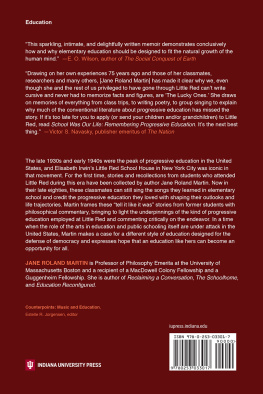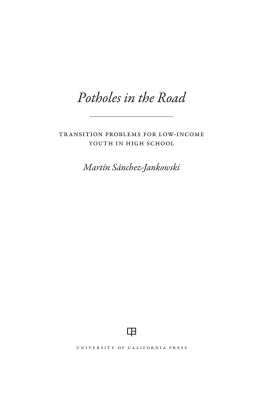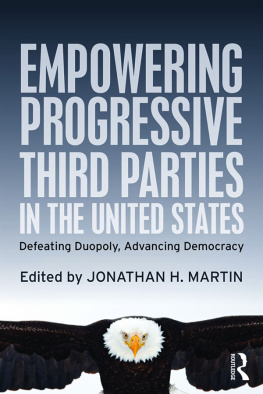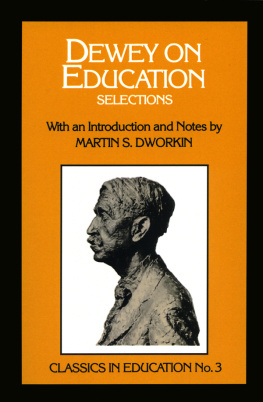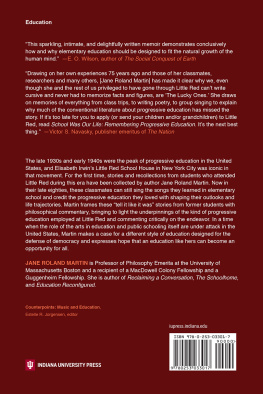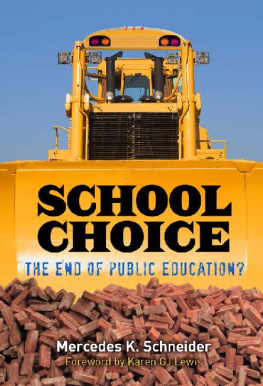Landmarks
Page-list
Acknowledgments
M Y THANKS GO first and foremost to my classmates for giving the interviews that ground this book. Next in line are Helena Ragon and the late Mary Woods for conducting the interviews, and the Spencer Foundation for supporting the first round of interviews under its Small Grants Program. I am also grateful beyond words to Florence Freed, Janet Giele, Jane Williams, and Maurice Stein for reading and commenting on the first draft of this book; Beebe Nelson and Duncan Nelson for going over that manuscript with a fine-tooth comb; Daniel Mulcahy and Tim Reagan for asking me to present my work at the 2012 meeting of the New England Philosophy of Education Society; the AHA committee at Brookhaven in Lexington for inviting me to speak in 2014 about us lucky ones; Leonard Waks for allowing me to present chapter 3 at the John Dewey Societys 2016 Centennial Conference on Democracy and Education in Washington, DC; and The MacDowell Colony for the priceless gift in the summer of 2016 of a studio in the woods and a magically congenial environment in which to finish this volume. Michael Martin died before my work was done, but he accompanied me to our very first class reunion, attended several succeeding ones, and saw for himself that we were indeed the lucky ones. I dedicate this book to Elisabeth Irwin, in memory. As the song we sang at her memorial said and as the interviews testify, she truly was the mother of our youth.
This book is a publication of
Indiana University Press
Office of Scholarly Publishing
Herman B Wells Library 350
1320 East 10th Street
Bloomington, Indiana 47405 USA
iupress.indiana.edu
2018 by Jane Roland Martin
All rights reserved
No part of this book may be reproduced or utilized in any form or by any means, electronic or mechanical, including photocopying and recording, or by any information storage and retrieval system, without permission in writing from the publisher.
The paper used in this publication meets the minimum requirements of the American National Standard for Information SciencesPermanence of Paper for Printed Library Materials, ANSI Z39.48-1992.
Manufactured in the United States of America
Cataloging information is available from the Library of Congress.
ISBN 978-0-253-03301-7 (cloth)
ISBN 978-0-253-03302-4 (paperback)
ISBN 978-0-253-03303-1 (ebook)
1 2 3 4 523 22 21 20 19 18
In Memory
Elisabeth Antoinette Irwin (18801942)
Mother of our youth
Foreword
Estelle R. Jorgensen
J ANE ROLAND MARTINS School Was Our Life: Remembering Progressive Education opens a different perspective on music education for readers of the Counterpoints: Music and Education series. Teachers, students, and parents will be familiar with her situated picture of musical and artistic education as a part of public school education. Much music education writing focuses on aspects of music teaching, learning, instruction, curriculum, and administration that too often are considered independently of other subjects and exist on the margins of general education and schooling. Martin adds an important dimension to the literature on music and the arts in education by viewing them contextually rather than apart from the rest of general education. She writes with a broad perspective on culture and schools. Her memories and those of her classmates are clearly musical and poetic yet her present focus is on schooling and its connectedness to the rest of life. The arts emerge throughout her narrative in conjunction with other subjects, sometimes incidentally and other times focally. Sometimes, they assist in learning and retaining other subject matter and other times they are interesting and meaningful for their own sake.
Progressive educational and artistic ideas are enjoying something of a renaissance in our time along with a renewed interest in the writings of John Dewey. Martin pictures progressive education for us as she reflects on her experience and that of her fellow classmates at Little Red, an independent school in New York City. Here we see the school through the eyes of these students as they recall their school experiences and reflect on what this education means to them toward the end of their lives. True, memory can play tricks on one and the passage of time can romanticize what really occurred. Still, this school powerfully impacted the lives of its students. There are high points of shared experience in the confluence of detailed memories and stories of their schooling and its integration with the rest of life. What is remembered after the passage of decades into old age represents the remainder after unimportant details have been forgotten. Martins account reveals the humanity of teachers and students in the school. It illustrates ways in which John Deweys hopes for an education that integrates school and life, the arts and other curricular subjects, the subject matter and the students, and notions of freedom and social control could be realized. At a time when public school teachers in American public schools too often find themselves beleaguered, it is inspiring to read Martins narrative of hopeful and humane schooling, in which students feel cherished, teachers love their subjects and their students, and the school is led by an enlightened principal.
Not surprisingly, Martin and her classmates feel fortunate to have received a rich education in things that mattered to them for the rest of their lives. Theirs was an emotionally, physically, and intellectually engaging education. The stickiness of the songs and poems that they learned by heart is extraordinary when one considers that more than seven decades have passed since they attended this school. Educators, and especially teachers of the arts, will want to understand what sort of education would prompt a life-long result. I visited with Martin during the time that she was completing this book. A grand piano sits in her living room with musical scores on it. The song book that music teacher Mrs. Landeck compiled for her students is still treasured by Martins former classmate Henry, and I count it a privilege to peruse his beautifully preserved copy. Thinking of a musical education that lasts makes me wish that every young person could remember the songs taught in elementary school with such relish and for so long. This is education that has clearly mattered to its participants in fundamental ways for a lifetime. Martins book prompts educators in all subjects to reflect on how our present work can have this powerful impact and how it might be undertaken in ways that seep deeply into the souls of all of its participants.
It is revealing to come unexpectedly upon the early work of Beatrice Landeck Marks (19041978) before she became a noted music educator and compiler and editor of American folk songs for school use. Decades before Zoltn Kodly popularized the use of folk songs in music for the young, Her music educational ideas were already taking shape in the songs she taught to her students at Little Red. As a progressive music teacher, her belief in the importance of finding songs that are like molasses and stick with people and her attention to repertoire and artistic performance as crucial elements of the musical education are already clear in her early public school music teaching.
Quite apart from what may be learned in this book about the intersection of school and life and the remembering of a past educational moment, educational researchers can benefit from reflecting on Martins cross-disciplinary methodological approach to this study. Qualitative research relies on a researchers intuitive grasp of a situation, in this case, that of a participant in the events described. It necessitates making meaning of the data in thoughtful and imaginative ways and writing a descriptive and evocative account that brings the subject matter alive for readers. Philosophy looms large over the investigation. As Martin invites us to imagine with her this remembrance of her life at school and school as life, we grasp the possibilities of going beyond telling a story, important as that may be, to exemplifying an educational practice that is humane, inclusive, holistic, experiential, life changing, and inspirational.

